新概念英语第2册Lesson2 Breakfast or lunch? 课件(共60张PPT)
文档属性
| 名称 | 新概念英语第2册Lesson2 Breakfast or lunch? 课件(共60张PPT) |

|
|
| 格式 | zip | ||
| 文件大小 | 14.9MB | ||
| 资源类型 | 试卷 | ||
| 版本资源 | 新概念英语 | ||
| 科目 | 英语 | ||
| 更新时间 | 2021-04-25 00:00:00 | ||
图片预览



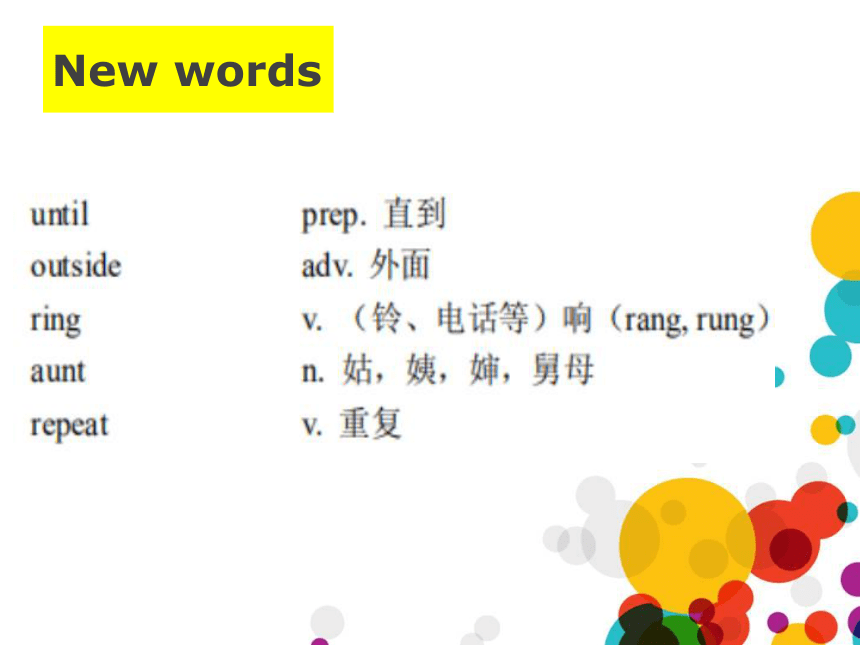
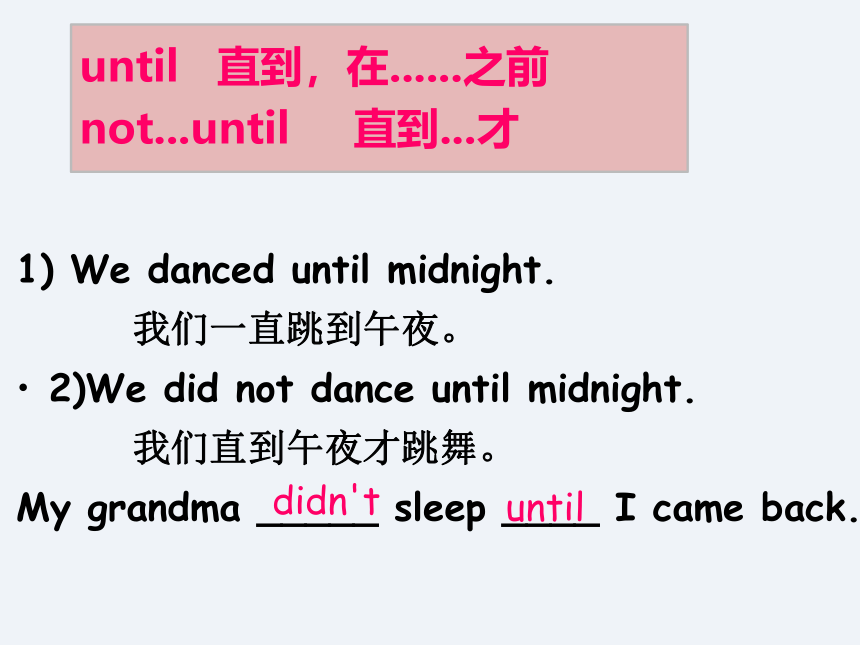
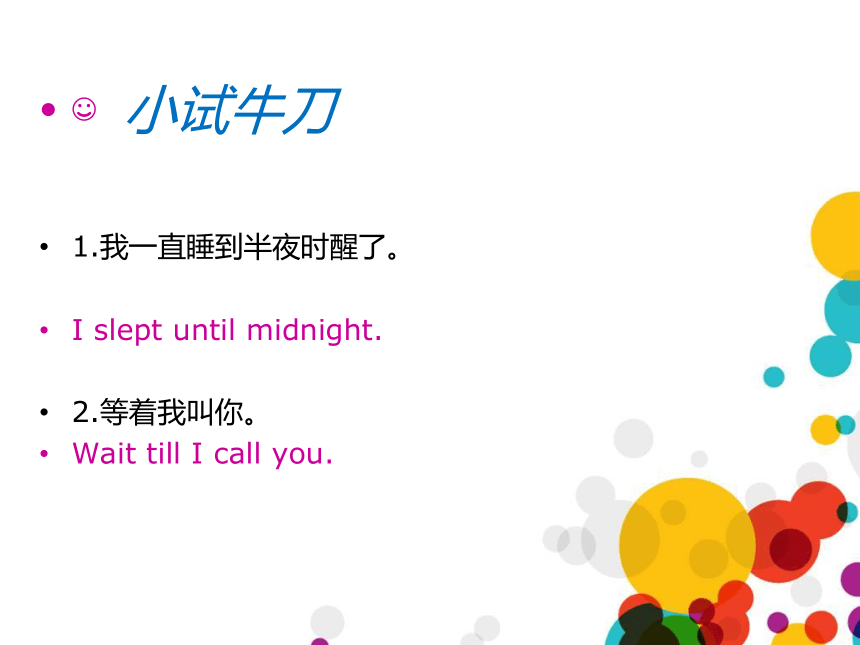
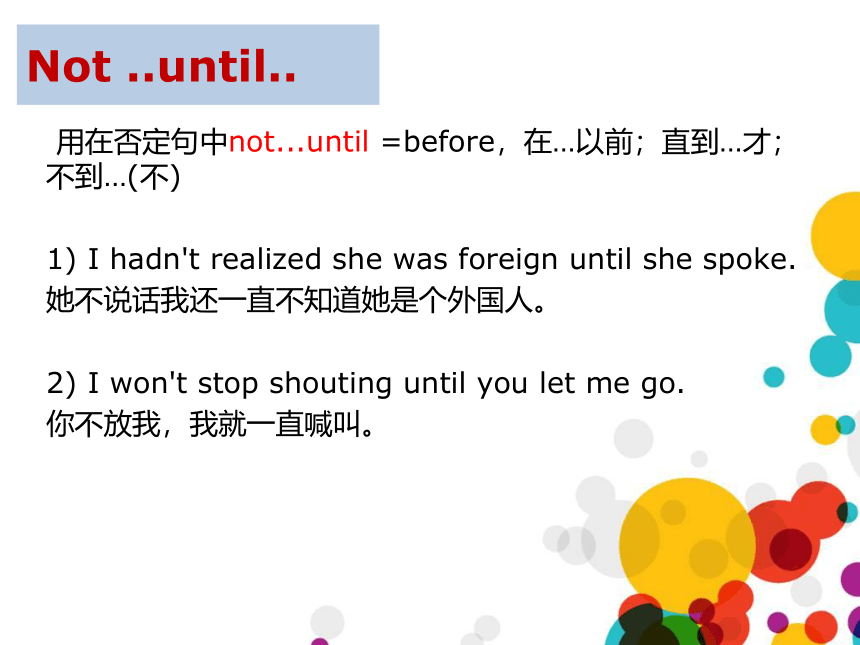

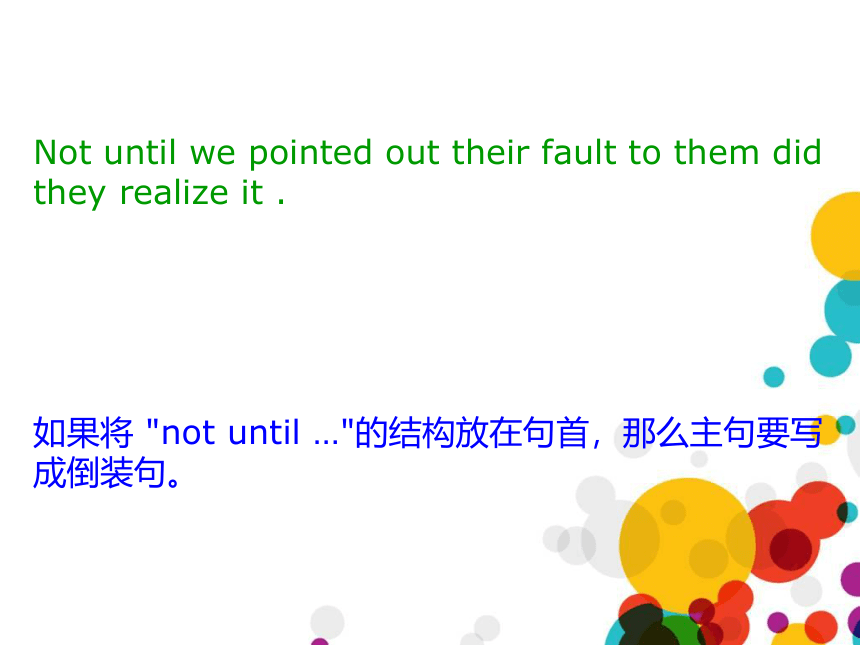
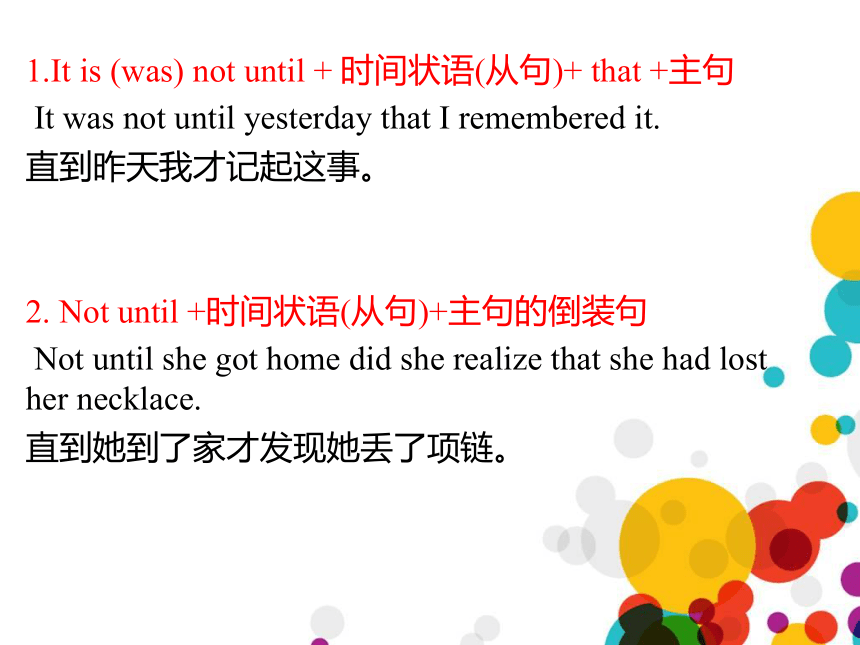
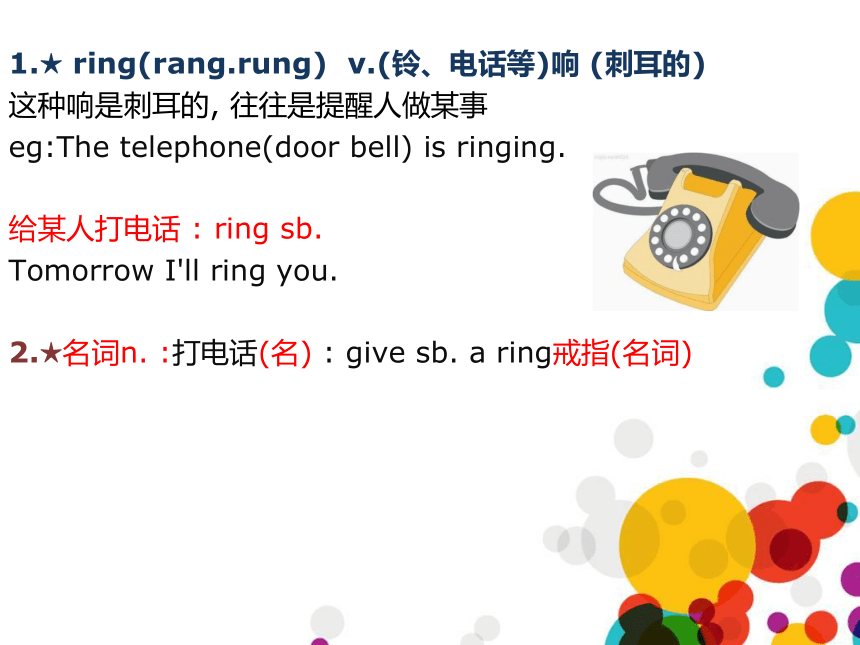
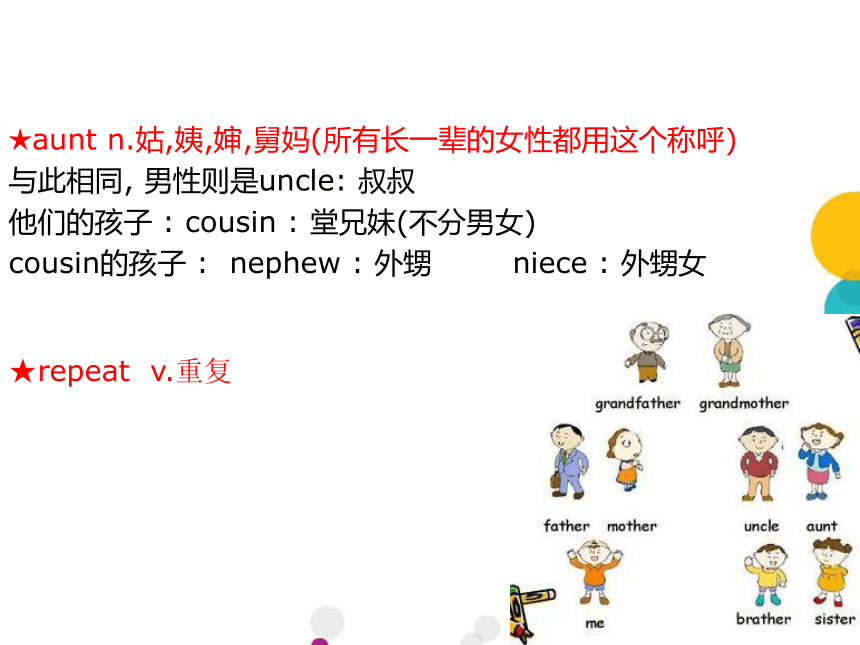
文档简介
(共60张PPT)
新概念第2册-lesson2
PPT
NCE
Lesson
2
Breakfast
or
lunch?
早餐还是午餐?
Free
talk
When
do
you
get
up
on
weekends?
Do
you
get
up
late?
Why?
What
do
you
usually
have
for
breakfast?
When
do
people
visit
friends
and
relatives(亲戚)
in
China?
Breakfast
+
Lunch
=
New
words
1)
We
danced
until
midnight.
我们一直跳到午夜。
2)We
did
not
dance
until
midnight.?
我们直到午夜才跳舞。
My
grandma
_____
sleep
____
I
came
back.
didn't
until
until?
直到,在......之前
not...until
直到...才
?小试牛刀
1.我一直睡到半夜时醒了。
I
slept
until
midnight.
2.等着我叫你。
Wait
till
I
call
you.
Not
..until..
用在否定句中not...until
=before,在…以前;直到…才;不到…(不)
1)
I
hadn't
realized
she
was
foreign
until
she
spoke.
她不说话我还一直不知道她是个外国人。
2)
I
won't
stop
shouting
until
you
let
me
go.
你不放我,我就一直喊叫。
?小试牛刀
他昨晚直到十二点钟才睡觉。
He
didn't
go
to
sleep
until
12
last
night
.
Not
until
we
pointed
out
their
fault
to
them
did
they
realize
it
.
如果将
"not
until
…"的结构放在句首,那么主句要写成倒装句。
1.It
is
(was)
not
until
+
时间状语(从句)+
that
+主句
It
was
not
until
yesterday
that
I
remembered
it.
直到昨天我才记起这事。
2.
Not
until
+时间状语(从句)+主句的倒装句
Not
until
she
got
home
did
she
realize
that
she
had
lost
her
necklace.
直到她到了家才发现她丢了项链。
1.★
ring(rang.rung)
v.(铃、电话等)响
(刺耳的)
这种响是刺耳的,
往往是提醒人做某事
eg:The
telephone(door
bell)
is
ringing.
给某人打电话
:
ring
sb.
Tomorrow
I'll
ring
you.
2.★名词n.
:打电话(名)
:
give
sb.
a
ring戒指(名词)
★aunt
n.姑,姨,婶,舅妈(所有长一辈的女性都用这个称呼)
与此相同,
男性则是uncle:
叔叔
他们的孩子
:
cousin
:
堂兄妹(不分男女)
cousin的孩子
:
nephew
:
外甥
niece
:
外甥女
★repeat
v.重复
★outside
adv.
外面
作状语
eg:
He
is
waiting
for
me
outside.
It
is
cold
outside.
Guess
早起的人
捷足先登
An
early
bird
The
early
bird
catches
the
worm.
Listening
for
the
gist
--Why
was
the
writer’s
aunt
surprised?
--Because
he
is
still
having
breakfast
and
it’s
already
one
o’clock.
Comprehensive
questions
What
day
was
it?
Do
you
ever
get
up
before
lunchtime?
What
was
it
like
outside?
What
happened
just
then?
Who
was
on
the
phone?
How
had
she
arrived?
Did
you
have
to
repeat
yourself?
It
was
Sunday.
I
never
get
up
early
on
Sundays.
I
sometimes
stay
in
bed
until
lunchtime.
Last
Sunday
I
got
up
very
late.
★
It
was
Sunday.那是个星期天
It
is
hot
today.今天挺热的。
It
is
12
o’clock
now.现在12点。
It
is
me.是我。
It
被
称
为
虚
主
语
it指时间、天气、温度或距离,也可以指
一件东西、一件事件或用来指是什么人
。
On
Sundays:
所有的星期天,每逢星期天
never:
从来不
(可以直接用在动词前面)=not
(变成否定句,前面一定要加助动词)
eg:I
don't
like
her.=I
never
like
her.
I
looked
out
of
the
window.
It
was
dark
outside.
'What
a
day!'
I
thought.
'It's
raining
again.'
I
looked
out
of
the
window.
It
was
dark
outside.
look
out
of
向外看
拓展:
1.look
out
小心,当心
2.look
at
=
have
a
look
3.look
after=take
care
of
照看,照顾
4.look
for寻找
5.look
up查字典
Let's
read:
Just
then,
the
telephone
rang.
It
was
my
aunt
Lucy.
'I've
just
arrived
by
train,'
she
said.
'I'm
coming
to
see
you.'
'But
I'm
still
having
breakfast,'
I
said.
'What
are
you
doing?'
she
asked.
'I'm
having
breakfast,'
I
repeated.
'Dear
me,'
she
said.
'Do
you
always
get
up
so
late?
It's
one
o'clock!'
Just
then,
the
telephone
rang.
It
was
my
aunt
Lucy.
just
then
就在那时
如果不知道对方性别,
他/她可以用it取代
e.g.
Who
are
you?/Who
is
it
?
by
I
go
out
by
bus.
I
go
out
in/on
two
buses.
Long
ago
people
could
go
to
America
only
by
sea.
My
aunt
left
by
the
9:15
train.
by
air
乘飞机
by
bicycle/bike
骑自行车
by
boat
乘船
by
bus
乘公共汽车
by
car
乘小汽车
by
land
由陆路
by
plane
乘飞机
by
sea
由海路
by
ship
乘船
by
train
乘火车
by
train
by
直接加交通工具(不能有任何修饰词,
复数)
如果加修饰词,
就要换掉by用in或on
I
go
out
by
bus.
若是两辆
:
I
go
out
in/on
two
buses.
I'm
coming
to
see
you.
我将要来看你.
用
come
的现在进行时态
be
coming
表示一般将来,表示近期按计划或安排要进行的动作。
同样用法的动词有:
go,come,leave,arrive,land,meet,die,start,return,join…
Dear
me!
天哪!
英国人说Dear
me!或My
dear!
美国人说
:
My
god!
boy!
brother!
man!
Oh,
my
goodness
!
Let's
read~
语法(一)
现在进行时
一般现在时
Now:
It’s
raining
.
I’m
coming
to
see
you.
I’m
still
having
breakfast.
What
are
you
doing
?
She’s
reading
in
bed
now.
He’s
sleeping
at
the
moment
.
Often
and
always:
I
never
get
up
early
on
Sundays.
I
sometimes
stay
in
bed
until
lunchtime.
Do
you
always
get
up
so
late
?
I
often
buy
CDs.
Do
you
ever
buy
CDs
?
语法:现在进行时&一般现在时-时间
用于现在进行时的时间状语:
now现在
at
the
moment
此时此刻
still
仍,还
用于一般现在时的频度副词:
always
总是
usually
通常
often经常
sometimes
有时
never
从未
ever
曾经
frequently
频繁地
seldom
很少
rarely很少
频度副词的位置:
位于主谓之间
sing
aloud
How
aloud
she
sings!
very
cold
What
a
cold
day
it
is!
感叹句
概念:
带有感叹号的句子
表示赞美、惊叹、喜悦等感情,或是喜怒哀乐、惊恐等强烈情绪。
The
rabbit
is
very
cute.
How
cute
the
rabbit
is!
What
a
cute
rabbit
it
is!
讲下列句子变成感叹句
The
hamsters
are
very
small.
How
small
the
hamsters
are!
What
small
hamsters
they
are!
讲下列句子变成感叹句
Flash
moves
slowly.
How
slowly
Flash
moves!
讲下列句子变成感叹句
The
cheetah
is
very
fat.
What
a
fat
cheetah
he
is
!
How
fat
the
cheetah
is
!
讲下列句子变成感叹句
结构1
How
clever
you
are
!
How
fast
he
runs
!
What
a
cute
rabbit
it
is
!
What
small
hamsters
they
are
!
What
good
weather
it
is
!
主+谓
形/副
名词词组
结构2
How+______________+____________!
How
fast
he
runs!
What+______+_______+_____________+________!
What
a
cute
rabbit
it
is!
What+________+___________________+________!
What
small
hamsters
they
are!
What
good
weather
it
is!
形容词/副词
a/an
形容词
可数名词单数
形容词
名词复数/不可数名词
(主+谓)
(主+谓)
(主+谓)
感叹句语序?
How
tall
the
giraffe
is!
How
tall
is
the
giraffe!
主+谓
How
fast
_________!
A.
does
the
boy
run
B.
is
the
boy
running
C.
the
boy
runs
D.
runs
the
boy
主+谓
delicious,
is,
the,
how,
soup
(!)
How
delicious
the
soup
is!
如何确定选用what还是how来引导感叹句?
1.
形名合,则用what
2.
形名分,则用how
3.
只有名词要用what
4.只有形容词/
副词则用how
1.
_____
a
big
apple
it
is!
2.
_____
cool
water
it
is!
3.
_____
tall
the
tree
is!
4.
_____
happily
they
are
playing!
5.
_____
big
eyes
she
has!
What
What
How
How
What
如何确定选择感叹词what还是how?
我命好幸福!
我
命
好
幸
福
!
what
名
how
形/副
what名how形副!
what
(a
/
an),
how
1.
_______
interesting
film
it
is!
2.
_______
sunny
day!
Let’s
go
out
for
a
walk.
3.
_______
careful
he
is!
4.
_______
expensive
trousers
they
are!
5.
_______
fine
weather
we
have
today!
6.
_______
wonderfully
she
played
basketball!
What
an
What
a
How
What
What
How
1.
____
a
big
apple
!
2.
____
cool
water
!
3.
_____
tall!
4.
_____
happily!
5.
_____
big
eyes!
What
What
How
How
What
1.在感叹句中,句子的主语谓语常省略。
无主谓,如何确定感叹词?
我命好幸福!
what名how形副
1.
_____
a
modern
house!
2.
_____
kind
you
are!
3.
_____
pretty
the
sunglasses
are!
4.
_____
a
nice
man!
5.
_____
interesting
books
I
have!
6.
_____
fast
he
drives!
7.
_____
delicious!
What
How
How
What
What
How
How
在感叹句中,
What和How引导的感叹句经常可以互换
1.What
a
good
car
it
is!
2.How
delicious
the
food
is!
=
How
good
the
car
is!
=
What
delicious
food
it
is!
感叹句转换
1.What
an
expensive
computer
it
is!
2.How
careful
the
boy
is!
3.How
clever
the
dogs
are!
=How
expensive
the
computer
is!
=What
a
careful
boy
he
is!
=What
clever
dogs
they
are!
感叹句的结构
what
+(a/an)+形容词+名词+主语+谓语
what
+
形容词+名词+主语+谓语
how
+形容词+主语+谓语
how+副词+主语+谓语
陈述句变感叹句
陈述句变感叹句之妙法:“一断、二添、三换位”
一断:先把陈述句从主谓结构之后断开。
如:This
is
‖a
very
big
house.
二添:即添感叹词。从主谓结构后面的短语中找出中心词,如果中心词为名词添what,中心词是形容词、副词,添how。如上句应添what。
三换位:把强调部分换到主谓结构的前面。如上句应转换为:
What
a
big
house
this
is!
注意:如果句中还有very,
quite,really
等修饰词时,转换为感叹句时
应去掉。
例:The
play
is
very
interesting
.
改:
How
interesting
the
play
is
!
练习:把下列句子改为感叹句
1.
The
flower
is
very
beautiful.
How
beautiful
the
flower
is
!
2.
This
is
a
beautiful
flower.
What
a
beautiful
flower
this
is
!
3.
He
has
a
nice
kite.
What
a
nice
kite
he
has
!
4.
Your
dog
is
very
lovely.
How
lovely
your
dog
is
!
5.
We
are
very
happy.
How
happy
we
are
!
课本-练习题P17
A:
What
引导的感叹句:
What
+______+形容词+_____名词___
数
+主语+谓语!
What+
_______+_____名词_____数+主语+谓语!
What
+
_______
+
_______名词
+主语+谓语!
How引导的感叹句:
How
+____________
+
主语
+
谓语!
What
与
How
引导的感叹句,
一般情况下可以互相转换,意义不变。
What
an
interesting
story
it
is!
=
__________________
the
story
is!
感叹句经常会省略____
语和_____语。
Eg.
What
a
nice
day!
Sum
up
a/an
可数
单
形容词
可数
复
形容词
不可数
形容词/副词
How
interesting
主
谓
⒈)
____
delicious
the
dish
is!
A.
What
B.
How
C.
What
a
⒉)
____
strange
clothes
he
is
wearing!
A.
What
a
B.
What
C.
How
a
⒊)
____
interesting
subject
it
is!
A.
What
B.
How
C.
What
an
⒋)
____
cloudy
it
was
yesterday!
A.
What
B.
How
C.
What
a
1.C
2.D
3.C
4.C
5.A
6.B
7.B
8.A
9.D
10.C
11.D
12.B
课本-练习题P19
https://www.21cnjy.com/help/help_extract.php
新概念第2册-lesson2
PPT
NCE
Lesson
2
Breakfast
or
lunch?
早餐还是午餐?
Free
talk
When
do
you
get
up
on
weekends?
Do
you
get
up
late?
Why?
What
do
you
usually
have
for
breakfast?
When
do
people
visit
friends
and
relatives(亲戚)
in
China?
Breakfast
+
Lunch
=
New
words
1)
We
danced
until
midnight.
我们一直跳到午夜。
2)We
did
not
dance
until
midnight.?
我们直到午夜才跳舞。
My
grandma
_____
sleep
____
I
came
back.
didn't
until
until?
直到,在......之前
not...until
直到...才
?小试牛刀
1.我一直睡到半夜时醒了。
I
slept
until
midnight.
2.等着我叫你。
Wait
till
I
call
you.
Not
..until..
用在否定句中not...until
=before,在…以前;直到…才;不到…(不)
1)
I
hadn't
realized
she
was
foreign
until
she
spoke.
她不说话我还一直不知道她是个外国人。
2)
I
won't
stop
shouting
until
you
let
me
go.
你不放我,我就一直喊叫。
?小试牛刀
他昨晚直到十二点钟才睡觉。
He
didn't
go
to
sleep
until
12
last
night
.
Not
until
we
pointed
out
their
fault
to
them
did
they
realize
it
.
如果将
"not
until
…"的结构放在句首,那么主句要写成倒装句。
1.It
is
(was)
not
until
+
时间状语(从句)+
that
+主句
It
was
not
until
yesterday
that
I
remembered
it.
直到昨天我才记起这事。
2.
Not
until
+时间状语(从句)+主句的倒装句
Not
until
she
got
home
did
she
realize
that
she
had
lost
her
necklace.
直到她到了家才发现她丢了项链。
1.★
ring(rang.rung)
v.(铃、电话等)响
(刺耳的)
这种响是刺耳的,
往往是提醒人做某事
eg:The
telephone(door
bell)
is
ringing.
给某人打电话
:
ring
sb.
Tomorrow
I'll
ring
you.
2.★名词n.
:打电话(名)
:
give
sb.
a
ring戒指(名词)
★aunt
n.姑,姨,婶,舅妈(所有长一辈的女性都用这个称呼)
与此相同,
男性则是uncle:
叔叔
他们的孩子
:
cousin
:
堂兄妹(不分男女)
cousin的孩子
:
nephew
:
外甥
niece
:
外甥女
★repeat
v.重复
★outside
adv.
外面
作状语
eg:
He
is
waiting
for
me
outside.
It
is
cold
outside.
Guess
早起的人
捷足先登
An
early
bird
The
early
bird
catches
the
worm.
Listening
for
the
gist
--Why
was
the
writer’s
aunt
surprised?
--Because
he
is
still
having
breakfast
and
it’s
already
one
o’clock.
Comprehensive
questions
What
day
was
it?
Do
you
ever
get
up
before
lunchtime?
What
was
it
like
outside?
What
happened
just
then?
Who
was
on
the
phone?
How
had
she
arrived?
Did
you
have
to
repeat
yourself?
It
was
Sunday.
I
never
get
up
early
on
Sundays.
I
sometimes
stay
in
bed
until
lunchtime.
Last
Sunday
I
got
up
very
late.
★
It
was
Sunday.那是个星期天
It
is
hot
today.今天挺热的。
It
is
12
o’clock
now.现在12点。
It
is
me.是我。
It
被
称
为
虚
主
语
it指时间、天气、温度或距离,也可以指
一件东西、一件事件或用来指是什么人
。
On
Sundays:
所有的星期天,每逢星期天
never:
从来不
(可以直接用在动词前面)=not
(变成否定句,前面一定要加助动词)
eg:I
don't
like
her.=I
never
like
her.
I
looked
out
of
the
window.
It
was
dark
outside.
'What
a
day!'
I
thought.
'It's
raining
again.'
I
looked
out
of
the
window.
It
was
dark
outside.
look
out
of
向外看
拓展:
1.look
out
小心,当心
2.look
at
=
have
a
look
3.look
after=take
care
of
照看,照顾
4.look
for寻找
5.look
up查字典
Let's
read:
Just
then,
the
telephone
rang.
It
was
my
aunt
Lucy.
'I've
just
arrived
by
train,'
she
said.
'I'm
coming
to
see
you.'
'But
I'm
still
having
breakfast,'
I
said.
'What
are
you
doing?'
she
asked.
'I'm
having
breakfast,'
I
repeated.
'Dear
me,'
she
said.
'Do
you
always
get
up
so
late?
It's
one
o'clock!'
Just
then,
the
telephone
rang.
It
was
my
aunt
Lucy.
just
then
就在那时
如果不知道对方性别,
他/她可以用it取代
e.g.
Who
are
you?/Who
is
it
?
by
I
go
out
by
bus.
I
go
out
in/on
two
buses.
Long
ago
people
could
go
to
America
only
by
sea.
My
aunt
left
by
the
9:15
train.
by
air
乘飞机
by
bicycle/bike
骑自行车
by
boat
乘船
by
bus
乘公共汽车
by
car
乘小汽车
by
land
由陆路
by
plane
乘飞机
by
sea
由海路
by
ship
乘船
by
train
乘火车
by
train
by
直接加交通工具(不能有任何修饰词,
复数)
如果加修饰词,
就要换掉by用in或on
I
go
out
by
bus.
若是两辆
:
I
go
out
in/on
two
buses.
I'm
coming
to
see
you.
我将要来看你.
用
come
的现在进行时态
be
coming
表示一般将来,表示近期按计划或安排要进行的动作。
同样用法的动词有:
go,come,leave,arrive,land,meet,die,start,return,join…
Dear
me!
天哪!
英国人说Dear
me!或My
dear!
美国人说
:
My
god!
boy!
brother!
man!
Oh,
my
goodness
!
Let's
read~
语法(一)
现在进行时
一般现在时
Now:
It’s
raining
.
I’m
coming
to
see
you.
I’m
still
having
breakfast.
What
are
you
doing
?
She’s
reading
in
bed
now.
He’s
sleeping
at
the
moment
.
Often
and
always:
I
never
get
up
early
on
Sundays.
I
sometimes
stay
in
bed
until
lunchtime.
Do
you
always
get
up
so
late
?
I
often
buy
CDs.
Do
you
ever
buy
CDs
?
语法:现在进行时&一般现在时-时间
用于现在进行时的时间状语:
now现在
at
the
moment
此时此刻
still
仍,还
用于一般现在时的频度副词:
always
总是
usually
通常
often经常
sometimes
有时
never
从未
ever
曾经
frequently
频繁地
seldom
很少
rarely很少
频度副词的位置:
位于主谓之间
sing
aloud
How
aloud
she
sings!
very
cold
What
a
cold
day
it
is!
感叹句
概念:
带有感叹号的句子
表示赞美、惊叹、喜悦等感情,或是喜怒哀乐、惊恐等强烈情绪。
The
rabbit
is
very
cute.
How
cute
the
rabbit
is!
What
a
cute
rabbit
it
is!
讲下列句子变成感叹句
The
hamsters
are
very
small.
How
small
the
hamsters
are!
What
small
hamsters
they
are!
讲下列句子变成感叹句
Flash
moves
slowly.
How
slowly
Flash
moves!
讲下列句子变成感叹句
The
cheetah
is
very
fat.
What
a
fat
cheetah
he
is
!
How
fat
the
cheetah
is
!
讲下列句子变成感叹句
结构1
How
clever
you
are
!
How
fast
he
runs
!
What
a
cute
rabbit
it
is
!
What
small
hamsters
they
are
!
What
good
weather
it
is
!
主+谓
形/副
名词词组
结构2
How+______________+____________!
How
fast
he
runs!
What+______+_______+_____________+________!
What
a
cute
rabbit
it
is!
What+________+___________________+________!
What
small
hamsters
they
are!
What
good
weather
it
is!
形容词/副词
a/an
形容词
可数名词单数
形容词
名词复数/不可数名词
(主+谓)
(主+谓)
(主+谓)
感叹句语序?
How
tall
the
giraffe
is!
How
tall
is
the
giraffe!
主+谓
How
fast
_________!
A.
does
the
boy
run
B.
is
the
boy
running
C.
the
boy
runs
D.
runs
the
boy
主+谓
delicious,
is,
the,
how,
soup
(!)
How
delicious
the
soup
is!
如何确定选用what还是how来引导感叹句?
1.
形名合,则用what
2.
形名分,则用how
3.
只有名词要用what
4.只有形容词/
副词则用how
1.
_____
a
big
apple
it
is!
2.
_____
cool
water
it
is!
3.
_____
tall
the
tree
is!
4.
_____
happily
they
are
playing!
5.
_____
big
eyes
she
has!
What
What
How
How
What
如何确定选择感叹词what还是how?
我命好幸福!
我
命
好
幸
福
!
what
名
how
形/副
what名how形副!
what
(a
/
an),
how
1.
_______
interesting
film
it
is!
2.
_______
sunny
day!
Let’s
go
out
for
a
walk.
3.
_______
careful
he
is!
4.
_______
expensive
trousers
they
are!
5.
_______
fine
weather
we
have
today!
6.
_______
wonderfully
she
played
basketball!
What
an
What
a
How
What
What
How
1.
____
a
big
apple
!
2.
____
cool
water
!
3.
_____
tall!
4.
_____
happily!
5.
_____
big
eyes!
What
What
How
How
What
1.在感叹句中,句子的主语谓语常省略。
无主谓,如何确定感叹词?
我命好幸福!
what名how形副
1.
_____
a
modern
house!
2.
_____
kind
you
are!
3.
_____
pretty
the
sunglasses
are!
4.
_____
a
nice
man!
5.
_____
interesting
books
I
have!
6.
_____
fast
he
drives!
7.
_____
delicious!
What
How
How
What
What
How
How
在感叹句中,
What和How引导的感叹句经常可以互换
1.What
a
good
car
it
is!
2.How
delicious
the
food
is!
=
How
good
the
car
is!
=
What
delicious
food
it
is!
感叹句转换
1.What
an
expensive
computer
it
is!
2.How
careful
the
boy
is!
3.How
clever
the
dogs
are!
=How
expensive
the
computer
is!
=What
a
careful
boy
he
is!
=What
clever
dogs
they
are!
感叹句的结构
what
+(a/an)+形容词+名词+主语+谓语
what
+
形容词+名词+主语+谓语
how
+形容词+主语+谓语
how+副词+主语+谓语
陈述句变感叹句
陈述句变感叹句之妙法:“一断、二添、三换位”
一断:先把陈述句从主谓结构之后断开。
如:This
is
‖a
very
big
house.
二添:即添感叹词。从主谓结构后面的短语中找出中心词,如果中心词为名词添what,中心词是形容词、副词,添how。如上句应添what。
三换位:把强调部分换到主谓结构的前面。如上句应转换为:
What
a
big
house
this
is!
注意:如果句中还有very,
quite,really
等修饰词时,转换为感叹句时
应去掉。
例:The
play
is
very
interesting
.
改:
How
interesting
the
play
is
!
练习:把下列句子改为感叹句
1.
The
flower
is
very
beautiful.
How
beautiful
the
flower
is
!
2.
This
is
a
beautiful
flower.
What
a
beautiful
flower
this
is
!
3.
He
has
a
nice
kite.
What
a
nice
kite
he
has
!
4.
Your
dog
is
very
lovely.
How
lovely
your
dog
is
!
5.
We
are
very
happy.
How
happy
we
are
!
课本-练习题P17
A:
What
引导的感叹句:
What
+______+形容词+_____名词___
数
+主语+谓语!
What+
_______+_____名词_____数+主语+谓语!
What
+
_______
+
_______名词
+主语+谓语!
How引导的感叹句:
How
+____________
+
主语
+
谓语!
What
与
How
引导的感叹句,
一般情况下可以互相转换,意义不变。
What
an
interesting
story
it
is!
=
__________________
the
story
is!
感叹句经常会省略____
语和_____语。
Eg.
What
a
nice
day!
Sum
up
a/an
可数
单
形容词
可数
复
形容词
不可数
形容词/副词
How
interesting
主
谓
⒈)
____
delicious
the
dish
is!
A.
What
B.
How
C.
What
a
⒉)
____
strange
clothes
he
is
wearing!
A.
What
a
B.
What
C.
How
a
⒊)
____
interesting
subject
it
is!
A.
What
B.
How
C.
What
an
⒋)
____
cloudy
it
was
yesterday!
A.
What
B.
How
C.
What
a
1.C
2.D
3.C
4.C
5.A
6.B
7.B
8.A
9.D
10.C
11.D
12.B
课本-练习题P19
https://www.21cnjy.com/help/help_extract.php
同课章节目录
